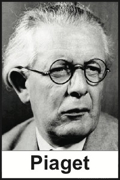 Jan. 4, 2013
Jan. 4, 2013
“Psychologist Jean Piaget reported that his earliest memory was of his nurse defending him against a potential kidnapper at age two. He distinctly recalled sitting frightened in the baby carriage while the nurse fought off the man (incurring a scratch on her face in the process), and the police officer chasing away the kidnapper with his short white baton. Piaget was even able to describe the officer’s uniform in detail. His family, relieved that the nurse had prevented his kidnapping, rewarded her with a gold watch.
“Thirteen years later, the nurse returned the gold watch to the family accompanied by a letter confessing that she had made up the story because she wanted to raise the family’s opinion of her.
“Piaget used this false memory to emphasize the role of others’ influences on one’s memories. He noted that the nurse frequently had recounted the story in his presence, and others then had repeated the story in his hearing, thus creating the memories he had adopted as his own.
“Piaget noted that even in his old age those memories persisted as clear events, even though he knew them to be false.”
– From “The Encyclopedia of the Brain and Brain Disorders” by Carol Turkington and Joseph Harris (2009)
Given this phenomenon of memory, it’s hardly surprising that no child-witness against the Edenton Seven has stepped forward to publicly recant.
